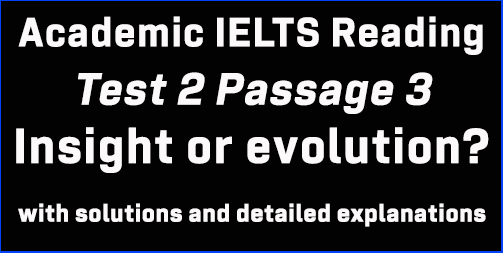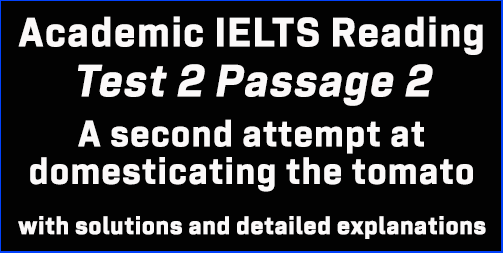IELTS Academic Reading: Cambridge 5 Test 1 Reading passage 1; Johnson’s Dictionary; with best solutions and best explanations
This Academic IELTS Reading post focuses on solutions to IELTS Cambridge 5 Reading Test 1 Reading Passage 1 entitled ‘Johnson’s Dictionary’. This is a targeted post for IELTS candidates who have big problems finding out and understanding Reading Answers in the AC module. This post can guide you the best to understand every Reading answer without much trouble. Finding out IELTS Reading answers is a steady process, and this post will assist you in this respect.
IELTS Cambridge 5 Test 1: AC Reading Module
Reading Passage 1: Questions 1-13
The headline of the passage: Johnson’s Dictionary
Questions 1-3: Choosing options from a list
[In this type of questions candidates are asked to choose some options (mostly THREE, FOUR or FIVE) for a question from a given list. The answer-finding process is similar to other questions – find the keywords in the text and look around it. This question doesn’t necessarily maintain any sequence.]
Which THREE of the following statements are true of Johnson’s Dictionary?
A. It avoided all scholarly words.
B. It was the only English dictionary in general use for 200 years.
C. It was famous because of the large number of people involved.
D. It focused mainly on language from contemporary texts.
E. There was a time limit for its completion.
F. It ignored work done by previous dictionary writers.
G. It took into account subtleties of meaning.
H. Its definitions were famous for their originality.
Keywords for the question: THREE, true, Johnson’s Dictionary,
Answers to questions 1-3 can all be found in paragraph no. 6. Let’s have a look there.
In the first few lines of paragraph no. 6, the writer says, “The work was immense; filling about .. . … . Johnson wrote the definitions of over 40,000 words, and illustrated their many meanings with some 114.000 quotations drawn from English writing on every subject, from the Elizabethans to his own time.”
Here, his own time = contemporary,
This line matches with –
D. It focused mainly on language from contemporary texts.
Also, in the same paragraph, look at lines 8-9, “ . .. He did not expect to achieve complete originality. Working to a deadline, he had to draw . .. . .. .”
Here, Working to a deadline = There was a time limit,
This line matches with –
E. There was a time limit for its completion.
Once again, in paragraph no. 6, take a look at these lines (13-16), “ . .. . Unlike his predecessors, Johnson treated English very practically, as a living language, with many different shades of meaning.
Here, many different shades of meaning = subtleties of meaning,
This line matches with –
G. It took into account subtleties of meaning.
So, the answers are: (in any order)
D, E, G
Questions 4-7: Summary completion
[In this kind of question candidates are given a summary for one, two or three paragraphs with some fill in the blanks questions. Candidates need to find out the related paragraphs by correctly studying the keywords form the questions. Then, they should follow the steps of finding answers to fill in the gaps.]
Question no. 4: In 1764 Dr Johnson accepted the contract to produce a dictionary. Having rented a garret, he took on a number of __________ who stood at a long central desk.
Keywords for the question: 1764, Dr Johnson, accepted, contract, to produce, dictionary, rented, garret, took on, a number of, who, stood, long central desk,
At the end of paragraph no. 4, the author writes, “ . . .. Johnson signed the contract for the Dictionary with the bookseller Robert Dosley at a breakfast held at the Golden Anchor Inn near Holbom Bar on 18 June 1764. He was to be paid £ 1.575 in instalments, and from this he took money to rent 17 Gough Square, in which he set up his ‘dictionary workshop’.”
Here, Johnson signed the contract for the Dictionary = Dr Johnson accepted the contract to produce a dictionary,
Then, at the beginning of paragraph no. 5, the author says, “James Boswell, his biographer described the garret where Johnson worked as ‘fitted up like a counting house’ with a long desk running down the middle at which the copying clerks would work standing up. . .. . .”
Here, work standing up = stood at,
So, the answer is: (copying) clerks
Question no. 5: Johnson did not have a _________ available to him, but eventually produced definitions of in excess of 40,000 words written down in 80 large notebooks.
Keywords for the question: did not have, eventually, produced, definitions, in excess of, 40000 words, written down, 80 large notebooks,
The answer can be found in paragraph no.6. At the beginning of the paragraph, the author mentions, “The work was immense; filling about eighty large notebooks (and without a library to hand). Johnson wrote the definitions of over 40,000 words, . .. .. .”
Here, without = did not have, to hand = available,
So, the answer is: library
Question no. 6: On publication, the Dictionary was immediately hailed in many European countries as a landmark. According to his biographer, James Boswell, Johnson’s principal achievement was to bring ___________ to the English language.
Keywords for the question: immediately hailed, European countries, landmark, biographer, James Boswell, principal achievement, bring, to the English language,
In paragraph no. 7, the writer says, “After many vicissitudes the Dictionary was finally published on 15 April 1775. It was instantly recognised as a landmark throughout Europe. . . .. .”
Here, instantly recognised = immediately hailed, throughout Europe = in many European countries,
Then, at the end of paragraph no. 8, we find the comment of James Boswell, “ . .. .. It is the corner-stone of Standard English, an achievement which, in James Boswell’s words, ‘conferred stability on the language of his country’.”
Here, in James Boswell’s words = According to his biographer James Boswell, conferred = was to bring, on the language of his country = to the English language,
So, the answer is: stability
Question no. 7: As a reward for his hard work, he was granted a _________ by the king.
Keywords for the question: reward, for, hard work, granted, by the King,
In the last paragraph (paragraph no. 9), the author says, “The Dictionary, together with his other writing, made Johnson famous and so well esteemed that his friends were able to prevail upon King George III to offer him a pension. .. .”
Here, offer him = he was granted, King George III = the King,
So, the answer is: pension
Questions 8-13: TRUE, FALSE, NOT GIVEN
[In this type of question, candidates are asked to find out whether:
The statement in the question agrees with the information in the passage – TRUE
The statement in the question contradicts with the information in the passage – FALSE
If there is no information on this – NOT GIVEN
For this type of question, you can divide each statement into three independent pieces and make your way through with the answer.]
Question no. 8: The growing importance of the middle classes led to an increased demand for dictionaries.
Keywords for the question: growing importance, middle classes, led to, increased demand, dictionaries,
In paragraph no. 3, the first few lines say, “Beyond the practical need to make order out of chaos, the rise of dictionaries is associated with the rise of the English middle class, who were anxious to define and circumscribe the various worlds to conquer – lexical as well as social and commercial. .. .. .”
Here, rise of the English middle class = growing importance of the middle classes, associated with = led to, the rise of dictionaries = increased demand for dictionaries,
So, the answer is: TRUE
Question no. 9: Johnson has become more well known since his death.
Keywords for the question: Johnson, become, more well known, since, death,
In paragraph no. 3, lines 8-13 say, “ . .. . It is highly appropriate that Dr Samuel Johnson, the very model of an eighteenth-century literary man, as famous in his own time as in ours, should have published his dictionary at the very beginning of the heyday of the middle class.”
Here, as famous in his own time as in ours = Johnson was as well known in his time as after his death, not more, not less,
So, the question contradicts the information in the text.
So, the answer is: FALSE
Question no. 10: Johnson had been planning to write a dictionary for several years.
Keywords for the question: Johnson, planning to write, dictionary, several years,
Paragraph no. 4 talks about Johnson’s decision about writing a dictionary. However, it doesn’t mention anywhere whether he had been planning to write it for several years or not.
So, the answer is: NOT GIVEN
Question no. 11: Johnson set up an academy to help with the writing of his Dictionary.
Keywords for the question: Johnson, set up, academy, to help, writing of his Dictionary,
At the end of paragraph no. 4, the writer says, “… .. . He was to be paid £ 1,575 in instalments, and from this he took money to rent 17 Gough Square, in which he set up his ‘dictionary workshop’.”
Here, dictionary workshop = not an academy,
So, the answer is: FALSE
Question no. 12: Johnson only received payment for his Dictionary on its completion.
Keywords for the question: Johnson, only received, payment, for, Dictionary, on its completion,
Again, in the same lines, the author says, “ . .. . He was to be paid £ 1,575 in instalments, and from this he took money to rent 17 Gough Square, in which he set up his ‘dictionary workshop’.”
This means Dr Johnson had already taken money from the amount he was to be paid. So, he already received money before the completion of the Dictionary project.
So, the answer is: FALSE
Question no. 13: Not all of the assistants survived to see the publication of the Dictionary.
Keywords for the question: not, all, assistants, survived, to see, publication, Dictionary,
At the end of paragraph no. 5, the author says, “ . .. . He was also helped by six assistants, two of whom died whilst the Dictionary was still in preparation.”
Here, two of whom died whilst the Dictionary was still in preparation = two of the assistants died before the publication of the Dictionary, means two of them did not survive,
So, the answer is: TRUE
Click here for solutions to Cambridge 5 AC Test 1 Reading Passage 2
Click here for solutions to Cambridge 5 AC Test 1 Reading Passage 3




2 thoughts on “IELTS Academic Reading: Cambridge 5 Test 1 Reading passage 1; Johnson’s Dictionary; with best solutions and best explanations”